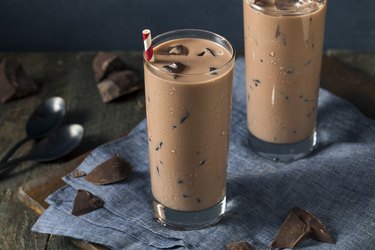
Chocolate milk ticks the comfort food box, making it pretty hard to resist. Here's what you need to know about chocolate milk's nutrition quotient and how to include it in your diet. While it's not the healthiest drink because of its sugar content, chocolate milk has some benefits to offer.
Chocolate Milk Nutrition Facts
Video of the Day
Chocolate milk is basically milk flavored with cocoa and sugar. The Dairy Council of California notes that all flavored varieties of milk, including chocolate milk, have the same nutrition as regular milk. According to the Dairy Council of California, chocolate milk offers the same amount of protein, calcium, magnesium, potassium, phosphorus and vitamins A, B and D as regular milk.
Video of the Day
Of these, calcium is a key nutrient that is usually obtained from milk and milk products. According to the USDA, there are 401 milligrams of calcium in 1 cup of chocolate milk, although the exact amount of calcium in your chocolate milk could vary slightly depending on the brand.
The National Institutes of Health recommends a calcium intake between 1,000 and 1,300 milligrams per day for adults, so the calcium in 1 cup of chocolate milk can help you achieve roughly one-third of your daily calcium requirement.
The USDA notes that, apart from calcium, 1 cup of chocolate milk has 149 calories and offers 7.99 grams of protein, 2.5 grams of fat, 24 grams of carbs (of which 22.01 grams are from sugar), 420 milligrams of potassium, 130 milligrams of sodium, 499 milligrams of vitamin A and 101 milligrams of vitamin D.
While the calories in chocolate milk are not empty calories because they also deliver nutrition, chocolate milk gets a bad rap because of its sugar content, which makes it a less healthy option compared to other drinks, like regular milk, for example.
The Dairy Council of California explains that all the sugar in chocolate milk is not added sugar; of the 22 grams of sugar in 1 cup of chocolate milk, roughly 12 grams of sugar are from lactose, which is a type of natural sugar found in milk. However, that still leaves you with around 10 grams of added sugar.
Chocolate Milk Benefits
Chocolate milk lovers needn't fret; chocolate milk has its place in a healthy, balanced diet as a post-workout beverage. Even the sugar content in chocolate milk has benefits if you drink it after working out.
According to the International Society of Sports Nutrition (ISSN), consuming foods or drinks with a combination of proteins and simple carbohydrates after a high-volume or intense workout can improve tissue repair and recovery, enhance protein synthesis and boost your mood. Chocolate milk offers both protein and simple sugars, making it a good candidate.
Drinking chocolate milk after an intense or vigorous workout also replenishes essential vitamins and electrolytes, and it provides your body with fluids to help it rehydrate. You may also find it easier to drink a glass of chocolate milk than to eat a meal with the same amount of carbs and proteins after a heavy workout. Readily available, inexpensive and easily portable, chocolate milk certainly gets points in the convenience department.
- Dairy Council of California: “Chocolate Milk”
- National Institutes of Health: “Calcium”
- USDA: “Chocolate Milk”
- National Institutes of Health: “Calcium and Vitamin D: Important at Every Age”
- U.S. National Library of Medicine: “International Society of Sports Nutrition Position Stand: Nutrient Timing”
- Children’s Hospital Colorado: “10 Benefits of Drinking Chocolate Milk for Nutrition Recovery”